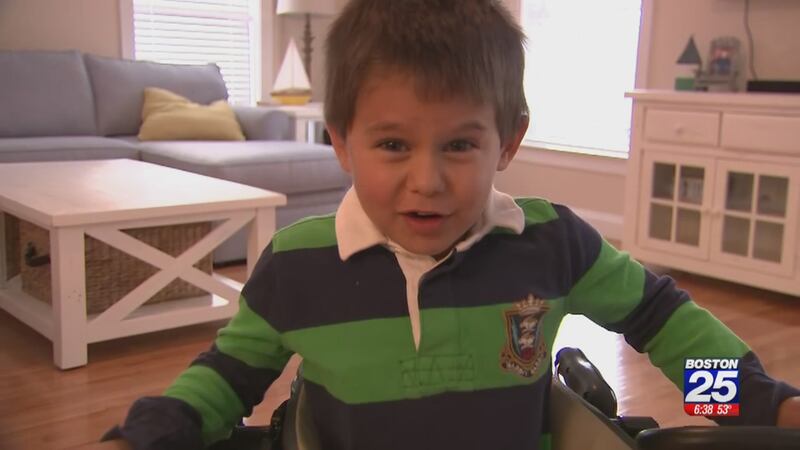AMESBURY, Mass. — A rare, polio-like virus that causes paralysis is affecting children across the country. The CDC first began investigating acute flaccid myelitis in 2014. One of the children who fell ill that year lives in Massachusetts.
He is a less than a one-in-a-million kid. At the age of six months, Noah Bolt was healthy one day, but not the next.
"On the morning of October 3, 2014, I went and got him out of his crib sat him on my bed and he fell backward," said Elisa Holt.
Acute flaccid myelitis - or AFM - causes sometimes profound weakness in the muscles. In Noah's case, it was rapidly progressive.
"As we were there that night, the paralysis was continuing to move up his body," said Holt.
NEW TONIGHT: @Mike_Jones_25 and I meet future @boston25 reporter Noah Holt and his Dad and Mom. The amazing 4-year-old is recovering from the rare disease Acute Flaccid Myelitis with a lot of hard work, a great attitude and a loving family. Go get ‘em, Noah! pic.twitter.com/2ehyLoUsb3
— Jim Morelli (@MorelliJim) October 17, 2018
Noah's treatment involves the use of steroids and his upper body recovered, but his lower body is still on the mend.
"He's able to stand on his own. He cruises around the house, grab a table and get around. He's getting stronger every day," said Mitch Holt.
That took years of intensive physical therapy and still more to come.
On a conference call Tuesday, a CDC doctor expressed frustration that researchers have not been able to pinpoint the cause of acute flaccid myelitis. One thing they have been able to identify is a distinct pattern in when the disease most commonly hits, which is late summer to early fall. That's when Noah fell ill and when the recent Massachusetts cases have been identified.
"It just breaks my heart for the families because we know how scary it is and there are no solid answers," said Elisa.
The Massachusetts Department of Public Health collaborates with CDC to actively investigate AFM cases.
Symptoms:
Most patients will have a sudden onset of weakness and loss of muscle tone and reflexes in the arms and legs. Some patients, in addition to the limb weakness, will experience:
- Facial droop or weakness
- Difficulty moving the eyes
- Drooping eyelids
- Difficulty swallowing or slurred speech
Numbness or tingling is rare in patients with AFM, though some patients have pain in their arms or legs. Some patients with AFM may be unable to pass urine. The most severe symptom of AFM is respiratory failure that can happen when the muscles involved with breathing become weak. This can require urgent ventilator support (breathing machines).
>> Acute flaccid myelitis: CDC sees rise in cases, seasonal pattern to polio-like illness
Cox Media Group






